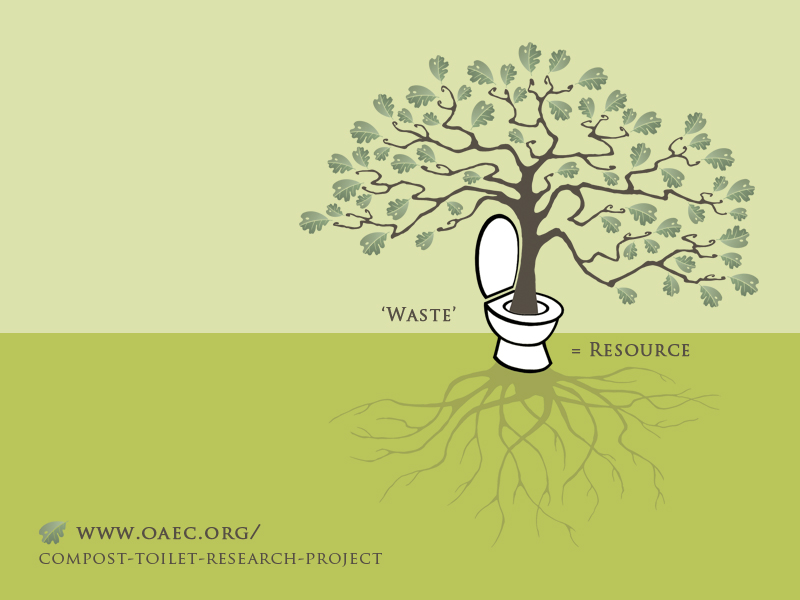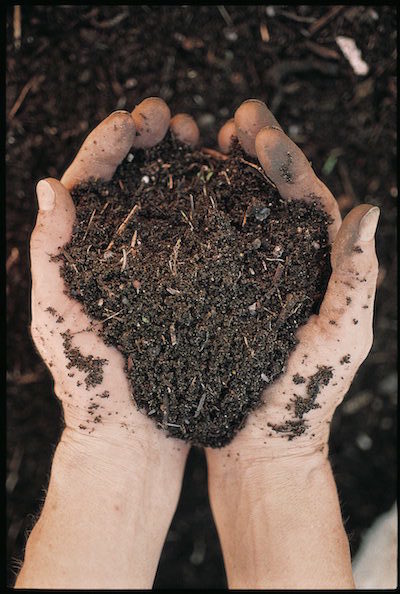Ecological sanitation is an age-old “technology” that protects human and ecosystem health while preventing water pollution, conserving energy, and capturing nutrients. Based in basic biological principles that recognize that Earth is a closed-loop system, ecological sanitation utilizes natural processes (in the case of composting toilets – the carbon cycle) to transform “waste” into a life-giving resource. Notably, it requires technical, institutional, social and economic management to ‘close the loop.’

A third of all household water is used to flush the toilet. Add to that all the water that is lost to leaky pipes and inefficient, aging centralized treatment infrastructure. With California’s current water, energy and climate concerns, there is an increased urgency for finding practical ways to treat human “waste” in ways that are, well, less wasteful.
Did you know? The transportation and treatment of water accounts for 20% of energy use in California! That means that when we waste water, we waste energy. And when we waste energy, we contribute to greenhouse gas emissions and climate change. This mounting crisis is known as the “water-energy nexus.” By treating human waste and managing it locally, instead of using large amounts of energy to pump it long distances in water, we can reduce both our water and energy footprints!

Deforestation, industrial agriculture, and over-development have broken the natural carbon cycle by polluting, paving over and eroding the world’s precious topsoils without putting anything back in return. Some scientists estimate that if topsoil degradation continues at the current rate, agriculture as we know it will be all but impossible in less than 60 years! Sludge from centrally treated wastewater is often mixed with industrial chemical waste, and although it is legal to return to the soil, can pollute the soil rather than enrich it. Decentralized composting toilets keep organic matter out of the water supply and capture nutrients rather than destroy them. Through OAEC’s research we hope to prove that compost is a safe and effective solution that addresses the most urgent issues of our time.
At OAEC, we consider soil and water to be baseline indicators of community health. WATER Institute Director Brock Dolman says, “By keeping human waste out of the water cycle and in the carbon cycle where it belongs, we work with, instead of against, Earth’s natural processes. This is one of the basic principles of permaculture design.” Furthermore, sinking carbon into the soil is one of the most effective strategies for climate change mitigation.
If California communities can begin to phase out water-based treatment infrastructure in favor of low-impact decentralized systems, we will save water, reduce pollution and greenhouse gas emissions, return nutrients to our soil and sequester carbon by using compost regenerate our eco-systems. By reimagining waste as a resource, ecological sanitation addresses a range of problems at the intersection of water, energy and soil, and promises a cutting-edge (though millennia old!) “nexus” solution.
“Pollution is nothing but the resources we are not harvesting. We allow them to disperse because we’ve been ignorant of their value.”
–R. Buckminster Fuller
WHY ECOLOGICAL SANITATION AT OAEC?
The average American flushes 16-24 gallons of clean water down the toilet every day. According to the World Health Organization, that’s 3 times more than the average global citizen uses for drinking, cooking and bathing combined!
At a regional, national and global scale, it is imperative that we in the overdeveloped global North dramatically reduce our water usage and carbon emissions as well as take radical action to promote soil health. Let’s not mince words. It’s time to deal with our shit.
Through our years of work in leading participants through Resilient Community Design processes, as well as research and demonstration in the field of Conservation Hydrology, OAEC has supported communities in taking the lead in designing or re-designing their own ecological human settlements. Systems that require minimal outside inputs, and instead, reimagine waste as a resource are key elements of any truly sustainable development. Closing this broken loop lies squarely at the center of the regenerative paradigm.
Significant progress has been made in recent years towards legalizing greywater reuse in California. As the drought stretches forward and governments take action, such as mandating a 25% urban water use reduction, we believe that composting toilets offer the next solution. But even when local government would like to pursue and support projects, it is complex to figure out where in our regulatory framework to house permits. The aim of this collaborative project is to work side-by-side with regulators to streamline the future permitting of this technology for multi-unit and medium-scale commercial facilities, such as hotels and apartment buildings. Much research has already been done on home-scale systems, but since the majority of our growing population lives in dense, urban settings, this is where solutions will have the greatest impact. Public health, building, and water quality regulators are eager for this research.
OAEC is excited and honored to be working on this difficult but critical leverage point in the system. As with many of our programs and issue areas, our place-based research at the OAEC site will allow us to develop a methodology that can be applied in communities around the world.
PROBLEMS THAT ECOLOGICAL SANITATION ADDRESSES AT VARIOUS SCALES:
Global: Systems design depends on context. In parts of the world where water is scarce or basic sanitation is lacking, such as disaster zones, affordable systems that manage waste in a biologically safe manner can prevent cholera and other epidemics. Read about the work of our allies at SOIL, who compost human “waste” into a resource in Haitian communities lacking infrastructure. In Sweden, 40% of new construction must use composting toilets!
National: While lack is the problem in many parts of the world, in the US, institutionalized overconsumption compounded by ecological illiteracy are the root causes that must be addressed culturally and structurally. The Ecological Sanitation movement raises awareness around how our (taboo) personal, human excrement is inter-connected to a complex of ecological problems OR possible solutions, depending on how we handle it. We hope that bringing the ‘waste’=resource refrain into the national mainstream dialogue will promote better understanding of the earth as a closed loop system as we find innovative ways to meet the mounting pressures of climate change.
California: As the nation’s agricultural center, threats to our water quantity and quality are a matter of national food security! And as the worlds 7th largest economy and the nation’s innovative leader in green industries and initiatives, California is in a unique position to develop cutting-edge, low-impact technologies (based on ancient knowledge) that create jobs and model a culture of resiliency. Ecological Sanitation systems promise to help California meet its ambitious long-term climate mandates was well as provide practical, immediate relief for communities already impacted by drought, pollution or inadequate infrastructure.
Sonoma County: Failing septic systems are causing substantive groundwater and creek pollution. Meanwhile, there is a silent epidemic of potable water loss through leaky pipes underground. Both of these problems can be addressed by phasing out aging infrastructure and transitioning to waterless, regenerative technologies. Composting toilets also offer affordable, eco-alternatives to chemical porta-potties for large events and other situations where temporary facilities are needed, such as farms and job sites.





